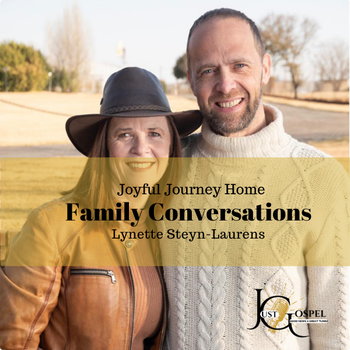
WOMEN IN CONVERSATION: NAVIGATING BURNOUT IN BUSINESS
Loading player...
Business leaders Helen and Jo tackled workplace burnout and self-care challenges facing professional women in a candid discussion on Just Gospel's "Just Business" program.
THE WAKE-UP CALL
The conversation emerged from Jo's five-day off-grid retreat in the Karoo, which raised questions about practical burnout solutions. While transformative, not every woman has access to such extreme measures. Helen shared a vulnerable moment when she broke down that morning and told herself to "suck it up, cupcake." Jo's response was profound: "If I had told you that story, would you have said the same thing to me?" This highlighted how women extend compassion to others while denying it to themselves.
RECOGNIZING BURNOUT
Key warning signs include: feeling detached from daily activities, increased irritability, loss of joy, resentment toward those who rely on you, feeling overwhelmed by manageable tasks, and operating on autopilot. Jo's most profound realization was asking herself, "Why do I not feel joy anymore?"
The hosts identified four burnout patterns: The Over-Giver (can't say no), The Over-Doer (emotionally depleted), The Over-Achiever (always proving worth), and The Over-Thinker (constantly problem-solving). These patterns create stress that women wear as a "badge of honor" rather than recognizing as warning signs.
THE SELF-CARE CHALLENGE
Helen referenced Matthew 22:39—"Love your neighbor as yourself"—noting self-care is a biblical prerequisite for loving others. Yet women consistently care for everyone else first. The hosts emphasized self-care doesn't require grand gestures. Practical suggestions included: coffee dates with friends, blocking calendar time for personal activities, permission to rest without guilt, delegating household tasks, getting into nature, and identifying what energizes versus drains you.
Helen shared workplace initiatives including monthly "coffee chats" where women gathered not for business but to check on each other's wellbeing. Jo emphasized helping employees identify which work aspects bring joy versus drain them, then redistributing tasks accordingly.
THE PERMISSION PROBLEM
Carlett shared her journey of initially feeling guilty when taking time off, realizing she had to change her mindset to accept rest as necessary. The question arose: Who is judging us? Often, the harshest critic is ourselves. The hosts challenged women to stop comparing themselves to others and setting unrealistic expectations.
PRACTICAL TAKEAWAYS
List what energizes and drains you—do more of the former, less of the latter. Learn to say no to commitments that don't serve you. Calendar self-care as non-negotiable. Model healthy boundaries for other women. Remember: "Taking care of yourself doesn't mean me first, it means me too." As Arianna Huffington stated, "Give up the delusion that burnout is the inevitable cost of success."
The interview emphasized women supporting women is crucial. The hosts encouraged business leaders to "fix each other's crowns"—notice when fellow professionals struggle and offer support without judgment. Creating workplace cultures where vulnerability is acceptable and self-care is modeled from the top transforms organizational health.
The message was clear: prioritizing self-care isn't selfish ”it's essential. Only by filling our own cups first can we effectively pour into others. The permission to prioritize yourself starts with the decision to be kind to yourself first.
THE WAKE-UP CALL
The conversation emerged from Jo's five-day off-grid retreat in the Karoo, which raised questions about practical burnout solutions. While transformative, not every woman has access to such extreme measures. Helen shared a vulnerable moment when she broke down that morning and told herself to "suck it up, cupcake." Jo's response was profound: "If I had told you that story, would you have said the same thing to me?" This highlighted how women extend compassion to others while denying it to themselves.
RECOGNIZING BURNOUT
Key warning signs include: feeling detached from daily activities, increased irritability, loss of joy, resentment toward those who rely on you, feeling overwhelmed by manageable tasks, and operating on autopilot. Jo's most profound realization was asking herself, "Why do I not feel joy anymore?"
The hosts identified four burnout patterns: The Over-Giver (can't say no), The Over-Doer (emotionally depleted), The Over-Achiever (always proving worth), and The Over-Thinker (constantly problem-solving). These patterns create stress that women wear as a "badge of honor" rather than recognizing as warning signs.
THE SELF-CARE CHALLENGE
Helen referenced Matthew 22:39—"Love your neighbor as yourself"—noting self-care is a biblical prerequisite for loving others. Yet women consistently care for everyone else first. The hosts emphasized self-care doesn't require grand gestures. Practical suggestions included: coffee dates with friends, blocking calendar time for personal activities, permission to rest without guilt, delegating household tasks, getting into nature, and identifying what energizes versus drains you.
Helen shared workplace initiatives including monthly "coffee chats" where women gathered not for business but to check on each other's wellbeing. Jo emphasized helping employees identify which work aspects bring joy versus drain them, then redistributing tasks accordingly.
THE PERMISSION PROBLEM
Carlett shared her journey of initially feeling guilty when taking time off, realizing she had to change her mindset to accept rest as necessary. The question arose: Who is judging us? Often, the harshest critic is ourselves. The hosts challenged women to stop comparing themselves to others and setting unrealistic expectations.
PRACTICAL TAKEAWAYS
List what energizes and drains you—do more of the former, less of the latter. Learn to say no to commitments that don't serve you. Calendar self-care as non-negotiable. Model healthy boundaries for other women. Remember: "Taking care of yourself doesn't mean me first, it means me too." As Arianna Huffington stated, "Give up the delusion that burnout is the inevitable cost of success."
The interview emphasized women supporting women is crucial. The hosts encouraged business leaders to "fix each other's crowns"—notice when fellow professionals struggle and offer support without judgment. Creating workplace cultures where vulnerability is acceptable and self-care is modeled from the top transforms organizational health.
The message was clear: prioritizing self-care isn't selfish ”it's essential. Only by filling our own cups first can we effectively pour into others. The permission to prioritize yourself starts with the decision to be kind to yourself first.



